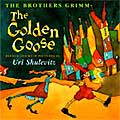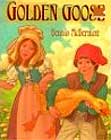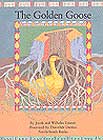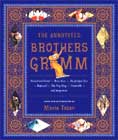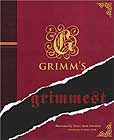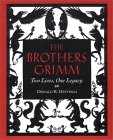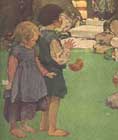
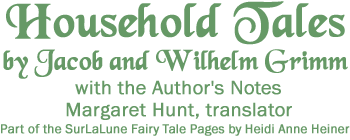
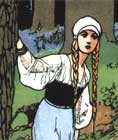
Author's Notes
translated by Margaret Hunt
Return
to
Household Tales:
Table of Contents
Previous
Tale:
The Three Feathers
SurLaLune Fairy Tales Main Page
The
Golden Goose
THERE was a man who had three sons,
the youngest of whom was called Dummling, and was despised, mocked, and
put down on every occasion.
It happened that the eldest wanted to go into the forest to hew wood, and before he went his mother gave him a beautiful sweet cake and a bottle of wine in order that he might not suffer from hunger or thirst.
When he entered the forest there met him a little grey-haired old man who bade him good-day, and said, "Do give me a piece of cake out of your pocket, and let me have a draught of your wine; I am so hungry and thirsty." But the prudent youth answered, "If I give you my cake and wine, I shall have none for myself; be off with you," and he left the little man standing and went on.
But when he began to hew down a tree, it was not long before he made a false stroke, and the axe cut him in the arm, so that he had to go home and have it bound up. And this was the little grey man's doing.
After this the second son went into the forest, and his mother gave him, like the eldest, a cake and a bottle of wine. The little old grey man met him likewise, and asked him for a piece of cake and a drink of wine. But the second son, too, said with much reason, "What I give you will be taken away from myself; be off!" and he left the little man standing and went on. His punishment, however, was not delayed; when he had made a few strokes at the tree he struck himself in the leg, so that he had to be carried home.
Then Dummling said, "Father, do let me go and cut wood." The father answered, "Your brothers have hurt themselves with it, leave it alone, you do not understand anything about it." But Dummling begged so long that at last he said, "Just go then, you will get wiser by hurting yourself." His mother gave him a cake made with water and baked in the cinders, and with it a bottle of sour beer.
When he came to the forest the little old grey man met him likewise, and greeting him, said, "Give me a piece of your cake and a drink out of your bottle; I am so hungry and thirsty." Dummling answered, "I have only cinder-cake and sour beer; if that pleases you, we will sit down and eat." So they sat down, and when Dummling pulled out his cinder-cake, it was a fine sweet cake, and the sour beer had become good wine. So they ate and drank, and after that the little man said, "Since you have a good heart, and are willing to divide what you have, I will give you good luck. There stands an old tree, cut it down, and you will find something at the roots." Then the little man took leave of him.
Dummling went and cut down the tree, and when it fell there was a goose sitting in the roots with feathers of pure gold. He lifted her up, and taking her with him, went to an inn where he thought he would stay the night. Now the host had three daughters, who saw the goose and were curious to know what such a wonderful bird might be, and would have liked to have one of its golden feathers.
The eldest thought, "I shall soon find an opportunity of pulling out a feather," and as soon as Dummling had gone out she seized the goose by the wing, but her finger and hand remained sticking fast to it.
The second came soon afterwards, thinking only of how she might get a feather for herself, but she had scarcely touched her sister than she was held fast.
At last the third also came with the like intent, and the others screamed out, "Keep away; for goodness' sake keep away!" But she did not understand why she was to keep away. "The others are there," she thought, "I may as well be there too," and ran to them; but as soon as she had touched her sister, she remained sticking fast to her. So they had to spend the night with the goose.
The next morning Dummling took the goose under his arm and set out, without troubling himself about the three girls who were hanging on to it. They were obliged to run after him continually, now left, now right, just as he was inclined to go.
In the middle of the fields the parson met them, and when he saw the procession he said, "For shame, you good-for-nothing girls, why are you running across the fields after this young man? is that seemly?" At the same time he seized the youngest by the hand in order to pull her away, but as soon as he touched her he likewise stuck fast, and was himself obliged to run behind.
Before long the sexton came by and saw his master, the parson, running behind three girls. He was astonished at this and called out, "Hi, your reverence, whither away so quickly? do not forget that we have a christening to-day!" and running after him he took him by the sleeve, but was also held fast to it.
Whilst the five were trotting thus one behind the other, two labourers came with their hoes from the fields; the parson called out to them and begged that they would set him and the sexton free. But they had scarcely touched the sexton when they were held fast, and now there were seven of them running behind Dummling and the goose.
Soon afterwards he came to a city, where a king ruled
who had a daughter who was so serious that no one could make her laugh.
So he had put forth a decree that whosoever should be able to make her
laugh should marry her. When Dummling heard this, he went with his goose
and all her train before the King's daughter, and as soon as she saw the
seven people running on and on, one behind the other, she began to laugh
quite loudly, and as if she would never leave off. Thereupon Dummling
asked to have her for his wife, and the wedding was celebrated. After
the King's death, Dummling inherited the kingdom and lived a long time
contentedly with his wife.
Grimm, Jacob and Wilhelm. Household Tales. Margaret Hunt, translator. London: George Bell, 1884, 1892. 2 volumes.
Notes
After a story from Hesse, and another from the neighbourhood of Paderborn. This last has the following variations: when Dummling has shared his food with the little man, the latter says, "Now lie down and sleep a while; and when thou awakest thou wilt find a sledge, to which a little bird is harnessed; and when it cries 'Kisi,' answer only 'Keifes;' and then thou wilt see what will happen." So Dummling lay down, for he was tired; and when he awoke, the sledge with the little bird was standing before him, and he seated himself in it, drove away, and came to a town. Three girls however were looking out of the window of one of the houses, and they saw the sledge with the little bird; and the eldest exclaimed, "I must have that bird!" but the youngest, who also wanted to have it, could run quicker, and got first into the street, and tried to grasp it. The little bird cried "Kisi!" and Dummling answered "Keifes," on which the girl stuck fast to the sledge, and could not get loose again, but was forced to try to seize the bird continually. And now came the two other sisters, and were held fast. Dummling drove onwards, and they reached a great piece of water, where many washerwomen were standing washing; and when they saw the girls they were angry with them for running after the sledge, and ran up to beat them with their wooden mallets; but they too were held fast, and were still forced to try to strike the girls. Then the parson and clerk came with the holy- water vessel, and they too were made fast, and thus the band grew greater, until Dummling arrived with it in the presence of the king's serious daughter, who laughed at the sight, and whom he now received to wife. The other tasks are not given. See The Golden Duck, in Meier, No. 17; and No. 27 in Pröhle's Märchen für die Jugend. Compare the story, The Miller and the Cat, No. 106.
As in this story, every one sticks fast to the goose, or to those who are touching it, so Loki sticks fast to the rod with which he is trying to strike the eagle (Thiasse). The rod, however, sticks to the eagle, and he is dragged away too (Younger Edda, Dames, 51). Just as the sons are tested by seeing if they are disposed to share a piece of cake, so Engelhart, in a poem of Konrad von Würzburg's, has three apples given him by his father, and is to give one of them to whomsoever he shall happen to meet; if the stranger eats the whole of it without giving him a piece he is to avoid him, but if the stranger gives him some he is to accept his friendship. The third is the first to behave kindly. Compare in Wyss's Volkssagen p. 321; and p. 22, the notes on the test by apples. A man who can drink a pond dry, or eat many thousands of loaves, appears in the Volksbuch of the Pomeranian Kunigund; see the story of The Seven Apprentices who get on in the World, No 71; and The Six Servants, No. 134.
©Heidi
Anne Heiner, SurLaLune Fairy Tales
E-mail: surlalune@aol.com
Page last updated October 15, 2006
www.surlalunefairytales.com

